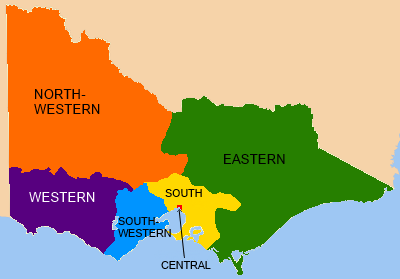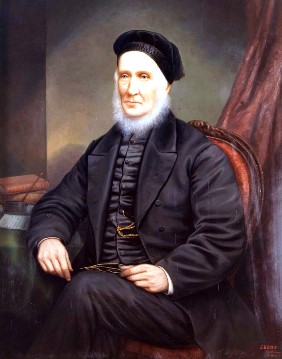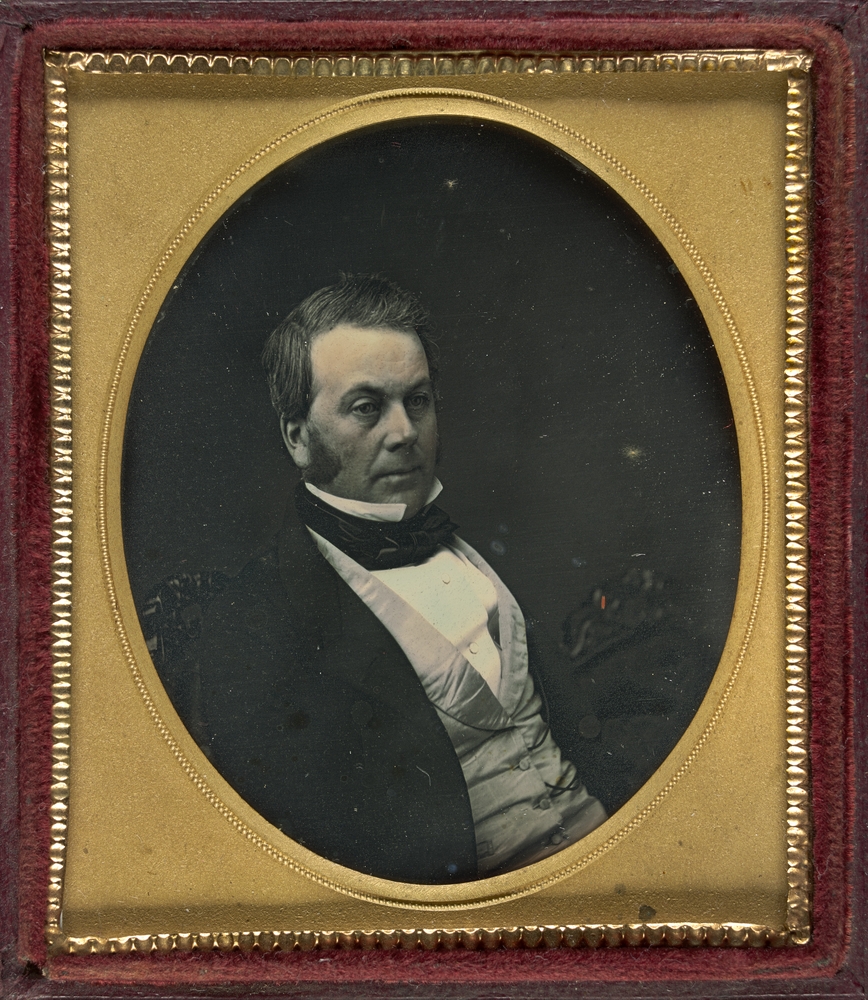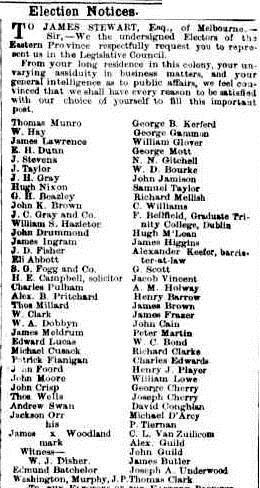The political and social alignments of the early residents of Wangaratta have long fascinated me. Who socialised or was in business with whom, was an indicator of town and sometimes family dynamics. While there were clearly divisions in Wangaratta, they were often not as rigid as we might imagine when viewing the mid 19th century though our 21st century lens. An example of this is that townsfolk of all persuasions contributed to various church funds and attended the ceremony for the laying of foundation stones for what we may now think of as a rival church. In a developing ‘settler society’ everyone was aware that the prosperity of the town, and therefore of their own business, depended on strong town growth. Non developing or small towns were often overshadowed by more highly developed places and diversity was the key to successful growth. As illustrated in my Trove Tuesday posts about Wangaratta, published in 1863 in the Ovens & Murray Advertiser, there was a lot at stake and township rivalry was rife. Having a sympathetic and active representative in Melbourne was a key ingredient for town success.
The post today is about an appeal in September 1856 by residents of the Eastern Province for James Stewart to stand for election to the Legislative Council in the first Victorian Parliament which met on the 21st November 1856. Stewart was elected to the Eastern Province of Victoria which covered around 40 percent of the colony. He remained one of the members until his untimely death in August 1863.
While in office Stewart rubbed shoulders with the likes of Stephen and James Henty, pioneers of Portland, and John Pascoe Fawkner.
John Pascoe Fawkner did not, however, impress some Wangaratta residents, particularly the outspoken and firey Irishman, Michael Cusack. In 1858 the Hon. Benjamin Williams (also representing the Eastern Province) travelled to Wangaratta to nominate for his expired seat. Standing against Williams for nomination was William Pearson. Both men made speeches to a small, unruly crowd from the first floor balcony of Meldrum’s Wangaratta Hotel. At stake was a Land Bill which the people hoped would force squatters off their huge leases and open up land for sale or selection in smaller holdings. Michael Cusack supported Williams against Pearson, who he claimed was a stooge of Gippsland squatters. Alexander Tone attempted to speak in support of the liberal minded Williams but was prevented by John Goodman the returning officer, who ruled that speeches were only allowed by the candidates, their nominators and seconders.
Mr. MICHAEL CUSACK endeavoured to point out to the Returning Officer that there was a precedent for the course taken by Mr. Tone, and we understood Mr. Cusack to say that it was permitted at the nomination of the billy–goat Fawkner.
These types of public declarations of political loyalty were quite common (as were the hilarious insults) and many candidates were reluctant to stand unless they could be assured of significant support. A show of hands in the above nomination gave Williams 44 votes and Pearson only one vote.
In a local history context political petitions are useful research tools to locate people, particularly if the subscribers were not actually enrolled to vote. Below is a transcription of the published request for James Stewart to stand for election in 1856. I cross referenced the names with the 1856 electoral roll and have listed in square parentheses the full name and occupation of the Wangaratta petitioners, as recorded on the electoral roll.
Election Notices.
TO JAMES STEWART, Esq., of Melbourne. Sir,-We the undersigned Electors of the Eastern Province respectfully request you to represent us in the Legislative Council.
From your long residence in this colony, your unvarying assiduity in business matters, and your general intelligence as to public affairs, we feel convinced that we shall have every reason to be satisfied with our choice of yourself to fill this important post.
Jacob Vincent [farmer]
Thos Millard [Thomas Millard, publican, Royal Victoria Hotel]
W. Clark * [William Henry Clark, publican, Commercial Hotel]
W. A. Dobbyn [William Augustus Dobbyn, surgeon]
James Meldrum *? [publican, Wangaratta Hotel]
Edward Lucas [storekeeper, store in Reid St]
Michael Cusack * [auctioneer]
Patrick Flanigan [carrier]
John Foord [builder, house in Baker St]
John Moore * [farmer]
John Crisp * [yeoman, Royal Hotel, tenant W. Murdoch, Wangaratta]
Andrew Swan [blacksmith]
Jackson Orr [carrier]
James Woodland (his mark), [carrier], Witness – W. J. Disher
Edmund Batchelor [Edward Batchelor, farmer]
Thos. Wells [Thomas Wells, not on 1856 electoral roll]
Thomas Clark [publican, Violet Town- no relation]
Richard Clarke * [publican, Benalla]
The 1856 electoral roll for Victoria is available on-line on a subscription basis. Men (only) qualified to be placed on the electoral roll if they met certain criteria, the most common of which was that they owned freehold land. Most of the 74 men recorded on this petition came from the Wangaratta, Beechworth, and Seymour electoral divisions. A few men in the Wangaratta division were registered to vote but did not sign the petition. These were: Samuel Evans, storekeeper; George Gray, squatter; Edward Green, squatter ; Thomas Learmont, storekeeper in Murphy St; William Middleton, farmer; Edward Sainthill Pearse, chemist in Murphy St; Cooper Searle, officiating minster, Church of England. I wonder if this indicates that they held opposing views to the majority who did sign the petition to Stewart or if they just weren’t around when the petition was circulated.
Men who are related to me are indicated by an * in the above article are. I have included Richard Clarke [sic] from Benalla as he was a brother of my great great great grandfather William Henry Clark. I need to do further research to confirm if James Meldrum’s wife Mary Leacy is related to me via her mother Mary Considine.









Hello Jenny, I think you should have another look at the Thomas Clark, publican at Violet Town. This Thomas died in 1858 at Violet Town and had an inn called the Royal Mail on the original closing of Honeysuckle Creek. He was a Catholic and was born in Belfast Ireland, with his father Hugh Clark. Very confusing I know but another Clark – Reay – had an inn at Kilmore after being in Hobart during 1830s and he came from Sutherland, in Scotland ( See Kilmore history and Vic BDMS.) I have researched this to see who was living in the North east when my ancestor came to the area.
Thanks for alerting me to this Helen. Even more confusing is a family tree that claims the Thomas Clark, publican at Violet Town as the same as mine, so I never had cause to look closely at him. I will take it that these documents were also based on assumptions rather than research! I knew about Reay Clark and had ruled him out of the picture. Who were your ancesotors?
Hi Jenny. Have you ever thought of proposing a little weekly column for your local newspaper, maybe a ‘lite’ version of what you write on your blog?
Hi Gael,
There are some local stalwarts who have done columns for many years but I’m not sure if they still do. I am trying to create new stories and put a different slant on the history so it might work.
My time is in short supply at the moment although I’d seriously consider it if I could earn something from it. 😉
Thanks for thinking I could even do that!
Jenny